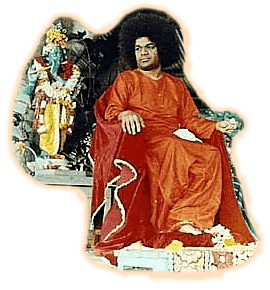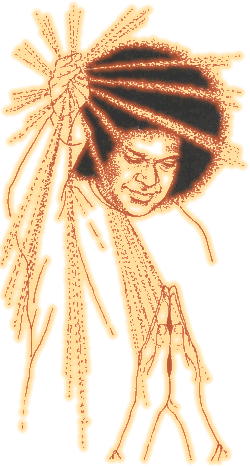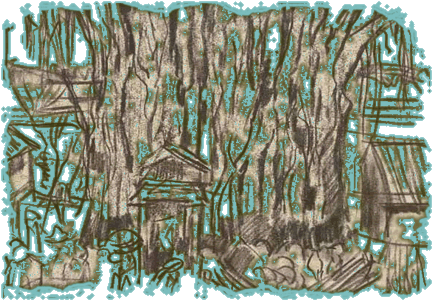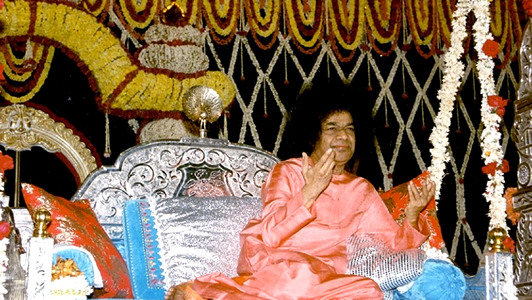|
Other Baba-books
|
||||||||
 |
The original
Sanskrit verses and with comments taken from the writings of
|
|||||||
|
'Punya Phalamu
Cheta Puttenu Manujudai One is born a
human by the fruit of meritorious deeds,
1 2a 2b 3 4 5 6 7 8 9 10 11 12 13 14 15 16 17 18a 18b
"
Listen to this spoken
chapter in Audio " In
the
chapter
Vibhuti Yoga (Yoga of His Opulences - 'On His
Identity''), Krishna proclaims His identity with the best and the most
exalted of all the sentient and the insentient beings in creation. It
is no doubt true that Krishna is omnipresent, that He pervades the
whole universe. Nevertheless, He identifies Himself only with the best,
the foremost and the highest of various beings, both animate and
inanimate. [Vibhuthi]- Summer Showers in Brindavan 1979, p. 163. śrī bhagavān uvāca na me viduh sura-ganāh yo mām ajam
anādim ca A man with a wavering
mind can never experience the divinity of nature. All creatures in the
world are manifestations of the divine. Krishna has vividly
demonstrated the divinity of creation in the Vibhuti Yoga (Yoga
of
His
Opulences - 'On His Identity' ) . - Summer Showers in Brindavan
1979, p. 13. buddhir
j˝ānam asammohah ahimsā
samatā
tushthis maharshayah
sapta pūrve etām
vibhūtim yogam ca aham
sarvasya prabhavo mad-cittā
mad-gata-prānā They fix the mind on Me,
they survive only because they breathe in Me, they inform each other
about Me, they talk only of Me, they are happy and content with these
only. - J˝āna Vahini, p. 44 tesām
satata-yuktānām teshām
evānukampārtham arjuna uvāca āhus tvām
rishayah sarve sarvam etad
ritam manye svayam
evātmanātmānam vaktum
arhasy aśeshena katham
vidyām aham yogims "I believe that
You have created the entire universe and that You are fostering it and
presiding over both the evolution and the involution of the worlds;
that You are the Master of srishti (creation), sthithi
(preservation, staying, abiding; also a state, position, condition) and
laya (dissolution, merging, absorption). You have
told me this Yourself. I am very grateful for this and I am happy that
I am considered worthy. vistarenātmano
yogam śrī
bhagavān uvāca aham ātmā
gudākeśa "Listen
carefully,
I
am the inner ātmā in the lotus heart of each and
every being. So, if you believe and direct your life on the basis of
the belief that the inner ātmā in every being is My Paramātmā
(the supersoul; transcendental nature of Krishna; the
omnipresent local personal aspect of Krishna), that is enough dhyana
(meditation) for you; stick to it steadily, practice
that belief, apply it in your deeds, words and thoughts. Then the
experience of Oneness, of your being Me and I being you, can be
achieved." -
Gītā Vahini, pp. 172-3 Krishna
said,
"aham ātmā gudākeśa". Krishna who is Hrishikeśa addressed Arjuna as Gudākeśa. Hrishikeśa is the
Lord, the Master of all senses. Arjuna is Gudakeśa, the one
who has acquired sense-control. Gudakeśa is the disciple of Hrishikeśa. The
Lord
of
the senses is the Supreme Guru and the one who has acquired
control of the senses is His śisya (to receive instruction
from the guru). Krishna is the Supreme Guru and Arjuna is His sincere śisya.
Arjuna
is
Narottama, the ideal human being, and Krishna is Purushothama
(the supreme Lord of all), the Supreme Purusha or God. Today there may be
good gurus but there are no sincere śisyas (pupils). This is
the influence of Kali on human beings. People remember and repeat
the name of Krishna but they do not put His teachings into practice. - Summer Showers in
Brindavan 1979, p. 101 ādityānām
aham vishnur vedānām
sāma-vedo 'smi rudrānām
śankaraś cāsmi purodhasām
ca mukhyam mām maharshīnām
bhrigur aham Not
only
in
the Kali-yuga but even in the earlier yugas,
the Krita (or Satya), Tretā and the Dvāpara, namasmarana
(remembering the name of God) has been the secret from bondage. The
temple is the place where namasmarana is natural and automatic and
undisturbed. Therefore, going to them is imperative, especially in the Kali
age when the air is full of wicked and ungodly thoughts. That is the
reason why in the Gītā, Krishna has declared that "Among yaj˝as,
I
am
the nama-yaj˝a, the yaj˝a that has the sacrificial beast
offered in the sacred fire, the animal aj˝āna (not j˝āna) itself." - Dharma Vahini, p. 80 aśvatthah
sarva-vrikshānām uccaihśravasam
aśvānām āyudhānām
aham vajram anantaś
cāsmi nāgānām prahlādaś
cāsmi daityānām pavanah
pavatām asmi sargānām
ādir antaś ca "The
five
elements,
earth, water, fire, wind and sky (ether) are also My
forms. I am the activity in the sun, moon and stars. When the great
destruction comes, I am the force of destruction and I am the force
that constructs again. I am everything from the microscopic to the
macroscopic; I am the past, the present and the future. I am the three
regions and the three gunas which have shaped man and nature.
There is no object which is not I; no name which is not Mine. Blood
taken from any part of the body is the same as from any other part; so
too, the divine is everywhere the same." - Gītā Vahini, p. 173 aksharānām
akāro 'smi mrityuh
sarva-haraś cāham Life has seven supreme
values, namely: kīrtih (reputation), sampada
(prosperity), vāk (eloquence), buddhi-shakti (power of
discrimination), medhā-shakti (supra-sensory intelligence), dhairya
(courage) and sahana (tolerance, forbearance). In order to
imbibe the essence of divinity, man should gain mastery over the powers
associated with these values of life. The
doer of virtuous deeds commands respect and reputation. Thus, one
should engage himself in the performance of action that will benefit
all. God's grace is the greatest wealth. To consider the amassing of
money, gold, or other material objects as symbols of wealth and social
prestige is incorrect. The goal of life, instead, should be the
acquisition of the divine wealth of God's grace. Real
eloquence consists in the exercise of restraint over speech. Excessive
talking, use of abusive and obscene language, and losing one's temper
while speaking are some of the blunders that the tongue is bound to
commit if it is engaged in constant chatter. The tongue is really meant
for chanting the various divinely potent names of the lord, like Govinda
(Krishna, as the friend of the cows), Dāmodara ('bound
belly'
-
name for toddler Krishna who stole the butter) and Mādhava (the
sweet
Lord descended) . - Summer Showers in
Brindavan 1979, pp. 151-2 Medhā-shakti,
(supra-sensory
intelligence),
which is also essential for the spiritual
regeneration of man, should be carefully distinguished from buddhi-shakti,
buddhi is the power of discrimination exercised
over the sensations and perceptions, pertaining to the five sensory
organs of sight, hearing, touch, taste, and smell. Medhā-shakti
is associated with supra-sensory experiences, extra-sensory perception,
intuition and spirituality. It transcends the sensations and
perceptions provided in the phenomenal world. Man
should be courageous. Lack of courage leads to doubts, despair,
dejection and depression. A person with a faultless and blemishless
character shall never behave like a frightened, trembling sheep.
Therefore, developing intellectual integrity and strength of
conviction, man should proceed ahead and conquer the evils and
temptations of the world. Forbearance,
the
paragon
of virtues, makes a man remain unruffled by the
vicissitudes of life. Neither elated by a happy turn of events nor
dejected on the occurrence of a tragedy, a man with fortitude is
unperturbed by the ups and downs in the endless drama of life. Such a
person endowed with inner tranquillity and peace of mind is the Sthitapraj˝a portrayed in the Bhagavad
Gītā. - Summer
Showers in Brindavan 1979, pp. 153 brihat-sāma
tathā sāmnām dyūtam
chalayatām asmi vrishnīnām
vāsudevo 'smi "Pāndavānām
Dhana˝jayah" or "among the Pāndavas I am
Arjuna", said Krishna in the tenth chapter of the Gītā, the chapter
titled Vibhuti Yoga. Furthermore among the names
that Arjuna has, the epithet Jayakrishna equates him with Krishna. Since Krishna was firmly
established in Arjuna's heart and since there was total spiritual
empathy between them, it is absolutely correct to say that Krishna was
not
only
the articulator of the Gītā but also the person who heard it. In
the
same
manner, Krishna has identified Himself with Vyāsa. "Among the munis, I am Vyāsa", said
Krishna. Not only this: the Lord dwells in the hearts of the sages. It
would, therefore, be quite correct to say that Krishna Himself wrote
the Gītā. -
Summer Showers in Brindavan 1979, pp. 162-3 Why,
the
Gītā
is but the essence of the Upanishads, is it not?
Arjuna acquired by the lessons of the Gītā the fruit of listening to
the Upanishads. In the Upanishads, the statement, Tat-tvam-asi,
"That
thou
art" is found; in the Gītā, Krishna says to Arjuna, "I am
Arjuna among the Pāndavas", that is to say, "I and You are the same".
This is the same as saying that "Thou art that", that Jīva and īśvara
are the same. -
Upanishad Vahini, p. 3 dando
damayatām asmi yac cāpi
sarva-bhūtānām nānto 'sti
mama divyānām Bliss
or
ananda is a divine vibhuti. That is why it
is said,
"happiness is union with God". Your true nature is bliss. Know this and
be cheerful always. The mind that is morose harbors nothing but malice
and jealousy. Divinity cannot reside in such unholy minds. Cheerfulness
is the first sign of spirituality. Therefore, strive to be happy
always. Live in contentment and with cheer, and hereby qualify yourself
for the experience of divinity, which is bliss supreme. Sound
or
sabda is also a vibhuti. Divinity is
described as sabda-brahma
mayi or as being immanent in sound. Use the faculty of your speech
in a manner that is coming from your divine status. Speak gently and
softly. Do not let your tongue indulge in evil talk or revile others,
and misuse the God-given gift of speech. - Summer Showers in Brindavan 1979, pp.
167-8 yad yad
vibhūtimat sattvam athavā
bahunaitena Vibhuti Yoga: Yoga of His Opulences - 'On His
Identity' .
|
||||||||






